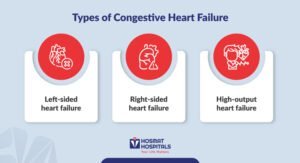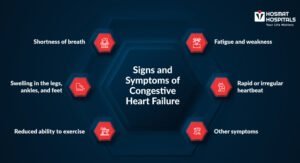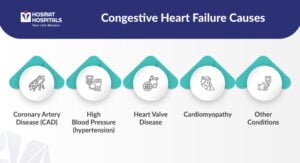
What is Congestive Heart Failure?
Congestive Heart Failure, or heart failure, is a chronic condition where the heart is unable to pump blood efficiently to meet the body’s needs. This can lead to a buildup of fluid in the lungs, abdomen, and other body parts, causing symptoms like fatigue, shortness of breath, and swelling in the legs.
Heart Failure vs. Heart Attack
There is a crucial difference between heart failure and a heart attack. A heart attack occurs when blood flow to a part of the heart is blocked, damaging the heart muscle. On the other hand, heart failure is a chronic condition where the heart’s pumping ability is impaired, often as a result of underlying health issues or damage to the heart muscle from previous heart attacks.
Congestive Heart Failure Types
There are three main types of congestive heart failure, classified based on which ventricle of the heart is primarily affected and its pumping ability:
- Left-sided heart failure
- Right-sided heart failure
- High-output heart failure
1. Left-sided heart failure
This is the most common type, occurring when the left ventricle, responsible for pumping oxygen-rich blood throughout the body, weakens and can’t pump enough blood. This causes blood to return to the lungs, leading to shortness of breath, fatigue, and swelling in the legs and ankles.
2. Right-sided heart failure
This develops when the right ventricle, responsible for pumping blood to the lungs, weakens and can’t pump blood efficiently. This often occurs as a complication of left-sided heart failure, but it can also be caused by lung diseases such as pulmonary hypertension. Symptoms include abdominal, leg, and ankle swelling, fatigue, enlarged liver, and rapid weight gain.
3. High-output heart failure
This is a rare type of heart failure that occurs when the heart pumps too much blood, often due to an underlying condition such as anaemia, hyperthyroidism, or Paget’s disease of bone. Symptoms are similar to other types of heart failure and may include shortness of breath, fatigue, and weakness.
Symptoms of Congestive Heart Failure
Heart failure manifests through a variety of symptoms, some of which may include:
-
Shortness of breath
This is often worse with activity or while lying flat, as fluid buildup in the lungs makes breathing difficult.
-
Fatigue and weakness
The body doesn’t receive enough oxygen-rich blood, leading to tiredness and a lack of energy.
-
Swelling in the legs, ankles, and feet
Fluid retention due to poor circulation causes puffiness, especially in the lower extremities.
-
Rapid or irregular heartbeat
The heart struggles to maintain a regular rhythm as it compensates for its weakened state.
-
Reduced ability to exercise
Even minimal exertion can become overwhelming due to shortness of breath and fatigue.
-
Other symptoms
A persistent cough with mucus, sudden weight gain due to fluid retention, abdominal swelling, difficulty concentrating, and nausea can also occur.
Causes of Congestive Heart Failure
Several factors can contribute to CHF:
-
Coronary artery disease (CAD):
The most common cause of CAD is the buildup of plaque in the coronary arteries, which reduces blood flow to the heart muscle.
-
High blood pressure (hypertension):
Uncontrolled high blood pressure strains the heart over time, leading to muscle weakness.
-
Heart valve disease:
Damaged heart valves can disrupt the normal flow of blood through the heart chambers.
-
Cardiomyopathy:
This disease directly affects the heart muscle, weakening its ability to pump.
Other conditions:
Diabetes, sleep apnea, and certain medications can also contribute to CHF.
Prevention and Management of Congestive Heart Failure
While some risk factors for CHF, such as age and family history, cannot be changed, there are steps you can take to reduce your risk:
- Maintain a healthy weight
- Exercise regularly
- Keep your diet balanced and low in saturated fats and salt
- Manage stress
- Avoid smoking and limit alcohol intake
- Maintain a healthy blood pressure, blood sugar, and cholesterol level
Conclusion
Congestive Heart Failure is a severe condition that requires proactive management and lifestyle changes to improve quality of life and reduce the risk of complications. Remember, early diagnosis and ongoing communication with your heart specialist are essential. Don’t hesitate to ask questions and express any concerns you may have.




